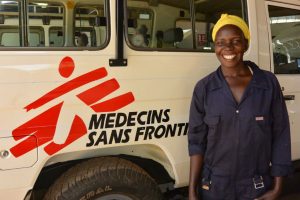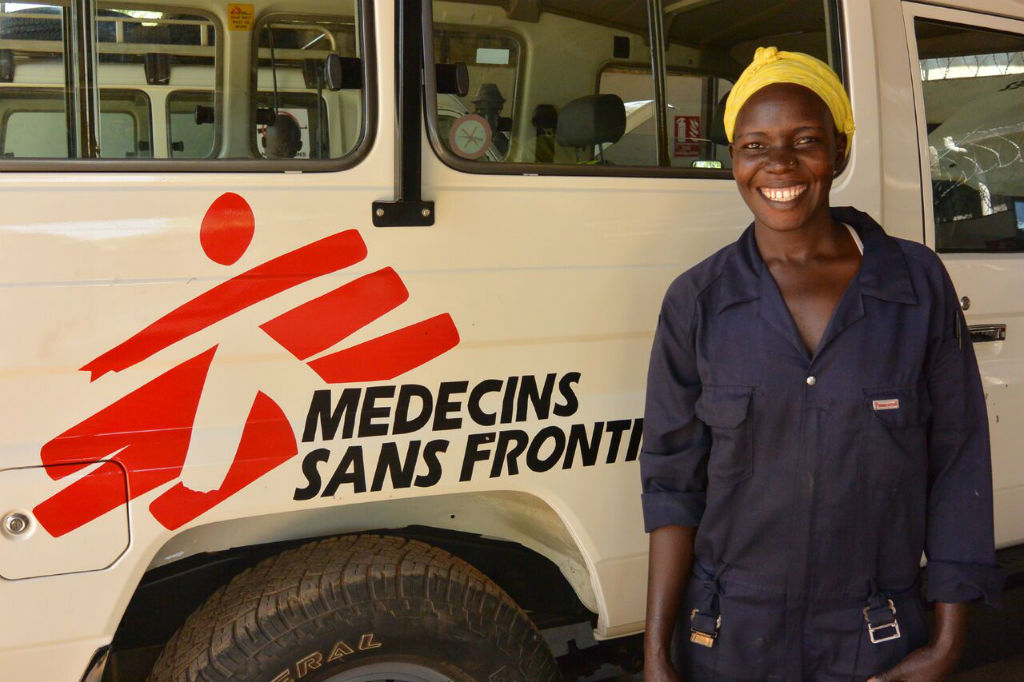
Juba, April 4, 2018 (SSNA) — It is 2:15PM. The afternoon’s scorching sun in Juba takes its toll on a group of mechanics in the MSF workshop. Dressed in navy blue overalls with beads of sweat lining their foreheads, the team is hard at work repairing and maintaining MSF’s vehicle fleet.
Among them is Poni Betty Towe. As the only female in the workshop, she is not your ordinary mechanic. Crouched under the hood of a Toyota Land Cruiser, she examines the engine. “This vehicle was brought here with an emission problem, and we believe the engine may have some problems,” she says as she pulls herself back from the vehicle and makes her way into a nearby office. Poni Betty is very likely the only female mechanic in the whole of South Sudan, and her journey to get where she was in this male dominated sector was a long one.
“I am the third born in a family of eight. Like many South Sudanese, I spent most of my childhood in a refugee camp in the northern part of Uganda, in Adjumani district. My childhood was not very rosy since we depended on food rations from aid agencies. We lived with our extended family and there was always a struggle for whatever little opportunities life could offer us. Luckily enough, we all received an education at different schools in Adjumani.”
Poni Betty did her Uganda primary school leaving examinations in 2001 at Esia primary school, which ranked her in the second highest class of students. This won her a scholarship from the United Nations High Commission for Refugees (UNHCR), which allowed her to join Saint Mary’s Assumta School for a secondary education. She passed her Uganda certificate of education examination in 2005 after four years of study. Throughout this period, her mind was focused on studying something to do with vehicles.
“Growing up in a refugee camp partly motivated me to take up this profession, because I would always be fascinated by the convoys of vehicles with flags flapping in the air, delivering humanitarian aid to refugees.”
Joining MSF
With the financial challenges that face many displaced people living in refugee camps, Poni Betty was not able to continue to higher education. With her Uganda certificate of education, she returned to her home country of South Sudan to look for a job and save some money so that she could return to school.
Luckily she happened across a charity program that worked at empowering youth like herself with livelihood skills. There, she learned mechanical engineering, electrical installation, and panel beating.
“We were only 2 girls in a batch of 40 students. The training was very intensive and emphasised practical knowledge more than the theoretical approach. We graduated with a certificate in 2008. Now, I am the only practicing female mechanic I know, since my other female classmate in the program decided to pursue another career,” she says.
After obtaining her certificate, Poni Betty started to hunt for jobs. She worked in different garages in Juba before eventually joining MSF in 2015.
“When I joined MSF, I was very excited because I knew my journey to becoming a mechanical engineer was on track. Secondly, when I entered this workshop I felt this was the place to gain more skills and make a contribution. The workshop is very big, organized, and has a lot of experienced, highly technical people.”
Poni Betty’s work entails both major and minor repair services as well as maintenance for all MSF vehicles and generators. Every Thursday, she leads a team of six mechanics to check up on the condition of MSF’s generators across all of organisation’s offices and guest houses in Juba. She says the spirit of team work is one of the most enjoyable parts of her job.
Defeating stereotypes
Poni Betty’s journey signifies resilience, determination, and a passion for a job not altogether common for women in South Sudan. She believes women love to drive, but unfortunately very few can do basic mechanics like changing the tire of a car. In her mind, society regards mechanics as a job reserved for men. “Many women believe it requires just energy and physical strength,” she adds. Because of the dirt and difficult grind that comes along with mechanical work, she thinks many women and girls fear they might not be able to stand it.
But even if other women aren’t interested in the job, Poni Betty finds it interesting in every aspect. From working in a diverse and challenging environment to doing what her male colleagues sometimes assume she cannot do. “I love repairing vehicles, because it makes me feel I have put something back to life.” When a vehicle gets back on the road to deliver much needed medical supplies to people, Poni Betty says she beams with pride.
Parenting and future plans
As a mother of two, Poni Betty says she is partly inspired by the love her children have for her work. She says they feel very proud seeing their mother in overalls, carrying a tool box to work. She adds that her husband has also been a great pillar in her life. He trusts and encourages her to work hard. However, Poni Betty’s wish to pursue higher education is outweighed by the need to tend to her children who are still in school.
“I would like to pursue a master’s degree, but now I am investing in the education of my children. Secondly, I would have to leave work if I went to study again. Engineering is not easy to understand with a long-distance study program.”
About the Joint workshop
MSF’s workshop in Juba handles servicing, repair, and maintenance for generators and over 300 of the organisation’s vehicles in South Sudan. Most of the vehicles are land cruisers and trucks that deliver lifesaving supplies and medicines to remote parts of the country. The workshop was established in 2011.

